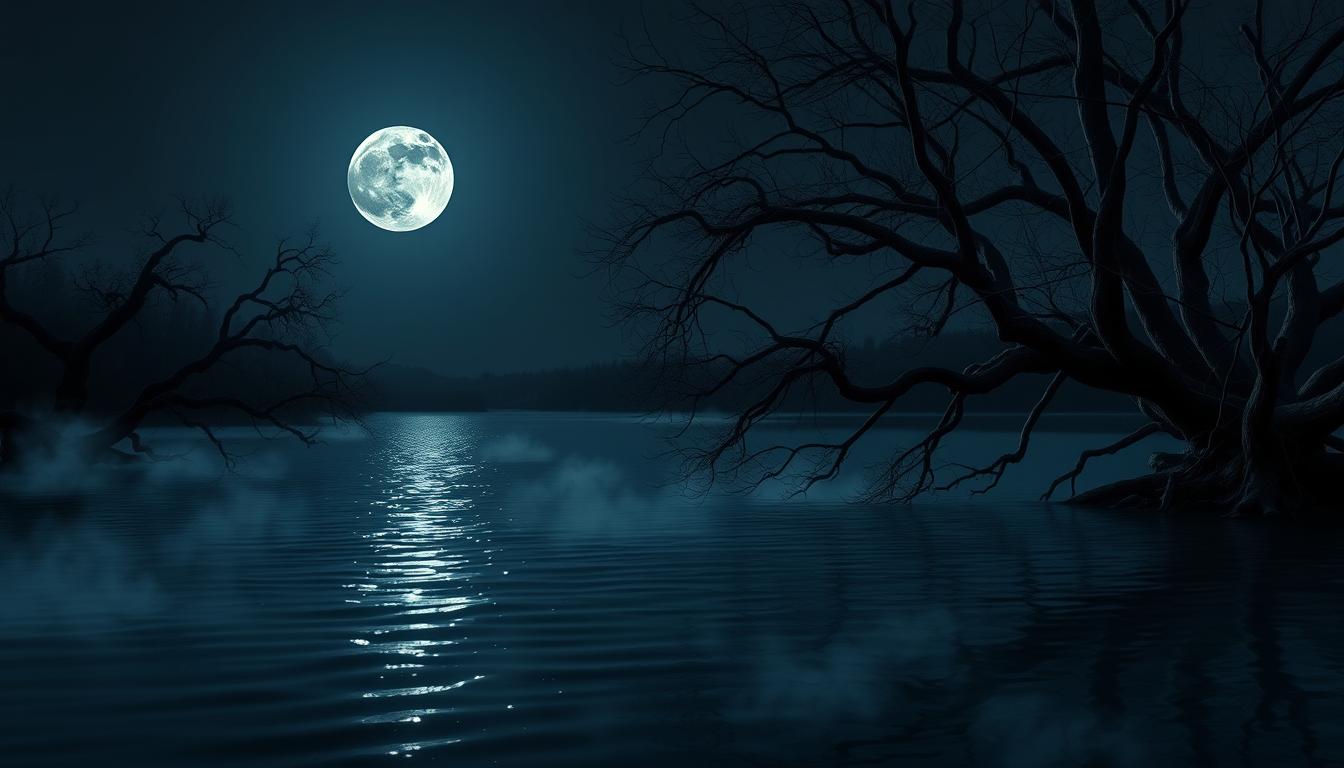Exploring Black Water Symbolism in Culture & Myth

The mystery of black water symbolism is found in many cultures and myths. It deeply affects spiritual practices and literature. Exploring black water shows it symbolizes taboo, mystery, and change in many stories.
The significance of black water goes beyond just being water. It plays a key role in stories of creation and destruction. Looking closer, we find hidden meanings of black water. These range from ancient taboos to the complex world of myths.
Black water is seen as a spiritual divide, like the Kala Pani in Hinduism. It also has deep meanings in psychology and art. Through symbols, we see black water as a metaphor for life’s cycles. It shows both good and bad, offering rich meanings to explore.
Black water’s power to change us is seen in many stories and rituals. It makes us think about crossing boundaries and looking within. From ancient fears to modern spiritual practices, black water is symbolic of growth and self-discovery.
To understand black water’s symbolism, we can look at rainbows as a spiritual contrast. Rainbows add light and hope, balancing black water’s darkness. For more on this, check out spiritual meanings tied to rainbows.
Key Takeaways
- Black Water Symbolism holds profound cultural and mythological significance, embodying taboo and transformation.
- The meaning of black water extends into the realms of creation myths and psychological metaphor.
- Black water’s symbolism reflects on rites of passage and profound life cycles.
- Understanding the significance of black water in various contexts enriches the appreciation for its role in human history and spirituality.
- The hidden meanings of black water challenge us to confront the unknown and seek deeper understanding.
- Whether feared or revered, black water remains a powerful spiritual symbol in myths and existence.
The Ancient Proscription of Kala Pani in Hinduism
The term Kala Pani Hinduism means a deep dislike for crossing oceans. This belief is based on old religious and cultural rules. It shows how important water and identity are in history.
The Dharma Sutra of Baudhayana says crossing the sea can hurt your social status. This was a big problem during the British rule, when sea travel was needed for trade and military.
Historical Foundations and Sea Voyage Taboos
There are strict rules against Samudrolanghana (crossing the sea) in Hindu culture. These rules are not just to punish but to protect spiritual life. Even skilled people were scared to go on sea voyages because of the risk to their cultural character.
But, some Hindu merchants ignored the taboo and traded in places like Burma and Muscat. They showed bravery in the face of danger.
The Cultural Impact During the British Period
In the 1850s, the British made laws like the General Service Enlistment Act. This forced soldiers to go overseas, breaking the sea taboo. This led to the Indian rebellion of 1857, showing the big cultural and personal changes caused by these laws.
In stories, the symbolism of dark water in Kala Pani is a powerful symbol. It shows the struggles of displacement and cultural change in Indo-Caribbean stories.
Modern-Day Perceptions and Temple Practices
Today, India still deals with the old taboo. Places like the Tirupati Temple have rules against priests who have crossed the sea. This shows the ongoing fight to mix old beliefs with new times.
| 1820s | 1856 | 2007 | |
|---|---|---|---|
| Events | Hindu merchants engage in overseas trade despite societal taboos. | General Service Enlistment Act induces widespread unrest. | Controversy over Sugunendra Tirtha’s temple role post-foreign travels. |
| Impact | Maintaining commerce | Triggering of the Indian rebellion 1857 | Debate on religious practices and modernity |
Understanding the symbolism of dark water and Kala Pani is key. It helps us see how Hindu culture has changed and adapted over time.
Black Water Symbolism in Literary and Spiritual Contexts
The spiritual significance of black water in stories and beliefs shows the community’s deepest truths. In books, black water is a strong symbol for emotional depth and changing feelings. It helps reveal hidden insights and encourages deep thinking.
Looking into the mind, black water’s meaning goes beyond just a symbol. It shows the power of purification and transformation. This ability to clean and change is key in many spiritual traditions and myths. It helps in personal and group renewal.
Dark Waters in Depth Psychology
In depth psychology, water stands for the unconscious mind. It’s vast, mysterious, and sometimes stormy. Dark waters symbolize the hidden parts of our minds. They are full of energy for healing and growth.
Transformation and Renewal in Mythical Water Stories
Myths about water show its power in many cultures. For example, the Babylonian epic of creation shows water’s role in creating the world. In Greek myths, rivers like Styx and Lethe are more than just waterways. They are paths to change and new beginnings.
These stories teach us about water’s deep meaning. It’s a source of life, a way to purify, and a path for transformation. Water, especially dark water, makes us think about life’s cycles and the constant flow of time.
Through stories and beliefs, black water invites us to explore our humanity. It shows the balance between destruction and renewal, which is at the heart of life.
Crossing the Black Water A Rite of Passage in History and Rebellion
The idea of crossing the “black water” is deeply rooted in history and culture. It often symbolizes mutiny, transformation, and breaking ties with home. This journey has marked a significant change in many lives, sparking resistance to such changes. It has left a lasting impact on cultural identities, especially in Indo-Caribbean communities.
Mutinies and Colonial Military Practices
Mutinies against sea voyages were common during the colonial era. Soldiers and sailors often rebelled against sea travel, seeing it as spiritually and physically dangerous. This resistance reflects deep fears and the religious importance of the Kala Pani rite of passage.
Historical records from the First Anglo-Burmese War show widespread dissent when troops were ordered to travel by sea to Chittagong. This highlights the cultural complexities of crossing sea boundaries against religious beliefs.
Indo-Caribbean Identity and Kala Pani Narratives
The journey of the indentured laborer diaspora across the black water was a pivotal moment in human migration. It deeply influenced the cultural mix in Indo-Caribbean regions. The Kala Pani narrative is more than just a story of travel; it’s a key part of Indo-Caribbean identity.
Authors like V. S. Naipaul explore these complex layers in their work. They show how these challenging journeys shaped the Indo-Caribbean Kala Pani cultural identity.
The essence and resistance tied to black water crossings transcend time and place. They continue to influence traditions and stories within the diaspora. What was once feared and taboo has become a symbol of endurance and cultural fusion.
| Event | Description | Impact on Cultural Identity |
|---|---|---|
| First Anglo-Burmese War Mutinies | Refusal by soldiers to cross the Kala Pani for deployment. | Highlighted the strong cultural and spiritual resistances to sea journeys. |
| Indentured Labor Migration | Large scale migration of Indian laborers to Caribbean colonies. | Formation of a unique Indo-Caribbean identity, blending Indian and Caribbean cultures. |
| Literary Contributions | Literature capturing the essence of Kala Pani crossings and their ramifications. | Enhanced understanding and preservation of historical and cultural narratives in Indo-Caribbean societies. |
Rivers as Boundaries and Pathways in Mythological Lore
Rivers have long been symbols in myths, showing the dual nature of water. They are key boundaries and paths to the spiritual world. These waters are vital for life and have deep spiritual meanings.
The Duality of Water in Creation Myths
In myths worldwide, rivers show a dual nature, of creation and destruction. They are seen as the source of life in many cultures. For example, in Greek myths, Okeanos is a vast river that surrounds the earth, giving life and fresh water.
These stories show water’s role in the world’s creation. It’s linked to divine powers and the flow of time.
Styx and Lethe: From Greek Traditions to Dante’s Inferno
The River Styx symbolism is powerful, marking the transition from life to death. It’s the boundary souls cross into the underworld. The River Styx separates the living from the dead.
The River Lethe, known for Lethe as forgetfulness, is also key in underworld stories. It offers forgetfulness, showing water’s power to change lives.
These rivers show the journey of life, influencing both heroes and ordinary people. They reflect the complexity of life, guided by gods or mythic quests, like in Dante’s Inferno.
The mystique of these waters, from the Ganges to the Styx, shows ancient cultures’ deep respect for water. This respect highlights water’s importance in shaping beliefs and values.
Exploring these rivers gives us insights into their environmental and spiritual significance. It shows how ancient cultures viewed the natural world, reflecting their fears and reverence.
Conclusion
The cultural significance of Black Water Symbolism is deep and complex. It touches on dreams, history, and spirituality. It offers insights into our minds and emotions.
Dark water symbols in our dreams and stories carry important messages. They warn us of challenges and encourage us to think deeply. You can learn more about this here.
Across cultures, black water symbolizes change and growth. It shows up in Hinduism and in Western and Eastern beliefs. It reminds us to look within and seek spiritual renewal.
The water strider, gliding on water, teaches us to face life’s hurdles with skill. The black water strider adds a layer of mystery and the need for inner journeys. This shows the power of spirituality, as seen in Indian traditions here.
From the Birmingham Civil Rights Institute to dream symbols, we seek meaning and growth. Black water’s nature calls us to explore its depths and clarity. It guides us to find balance and move forward, leaving past troubles behind.















